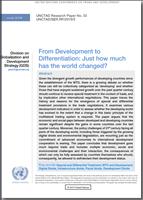
Given the divergent growth performances of developing countries since the establishment of the WTO, there is a growing debate on whether these can still be collectively categorized as 'developing' and whether those that have enjoyed sustained growth over the past quarter century should continue to receive special treatment in the context of trade, and by implication other international negotiations.
This paper traces the history and reasons for the emergence of special and differential treatment provisions in the trade negotiations.
It examines various development indicators in order to assess whether the developing world has evolved to the extent that a change in this basic principle of the multilateral trading system is required.
The paper argues that the economic and social gaps between developed and developing countries remain significant despite the gains in some countries over the last quarter century.
Moreover, the policy challenges of 21st century facing all parts of the developing world, including those triggered by the growing digital divide and environmental degradation, are mounting just as the commitment of advanced economies to international development cooperation is waning.
The paper concludes that development goes much beyond trade and includes multiple economic, social and environmental challenges and their interaction, the consequences of which can only be fully assessed by countries themselves who should, consequently, be allowed to self-declare their development status.


